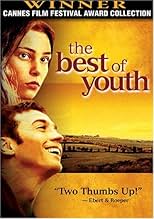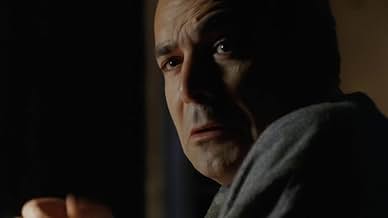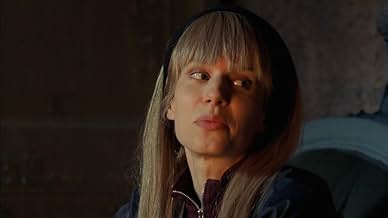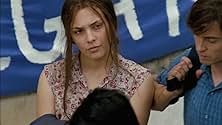CALIFICACIÓN DE IMDb
8.5/10
25 k
TU CALIFICACIÓN
Épica historia italiana que sigue la vida de dos hermanos desde los 60 hasta el final del siglo XX.Épica historia italiana que sigue la vida de dos hermanos desde los 60 hasta el final del siglo XX.Épica historia italiana que sigue la vida de dos hermanos desde los 60 hasta el final del siglo XX.
- Dirección
- Guionistas
- Elenco
- Premios
- 33 premios ganados y 25 nominaciones en total
- Dirección
- Guionistas
- Todo el elenco y el equipo
- Producción, taquilla y más en IMDbPro
Opiniones destacadas
10nturner
No, the number of minutes is no typo. This film is over six and a half hours long. But as Roger Ebert says, "I dropped outside of time and was carried along by the narrative flow; when the film was over, I had no particular desire to leave the theater, and would happily have stayed another three hours." Of course, I was watching in the comfort of my home but I agree completely with Mr. Ebert.
The narrative covers the years 1966 through 2003 and focuses primarily upon the older brother of a middle class Italian family. As it begins, the two brothers of the family are ready to pursue college education as an avenue to successful careers. The younger of them is volunteering at a local mental facility as a walker - a companion for patients who need to explore the world outside the institution. He finds that the girl he accompanies is being mistreated and more or less kidnaps her in an attempt to return her to her father's home. In this effort he seeks the help of his brother and the two embark upon an idealistic quest to return the girl to the love and safety of her home. The unhappy result of their venture changes the outlooks of both and sets them on paths which diverge from their original plans. Each chooses a new course which is in conflict with his basic personality. The older brother, who had been practical in all of his previous projects, finds himself diving into an alternative culture, whereas the younger, who had been more footloose, joins the military and eventually becomes a policeman. The encounters of both during the almost forty year span of the film gives us many insightful "what ifs" of two lives and reminds us of the enormous effect sheer chance has upon each of us.
If you are familiar with the Italian political climate and events during the era of this film, your enjoyment will be heightened , but even someone as politically innocent as I had no trouble understanding the conflicts of the major characters that come from diverging ideologies. (I can probably be pretty much assured that if you are a HSC "regular" you are well versed in the politics of Italy in the latter part of the Twentieth Century.) This film has a great "feel" to it in that it doesn't fall into the trap of being overly melodramatic, which is often the bent of films that span long periods of time. I was left with a good feeling at the end but it arose from having viewed the triumphs and tragedies of a very believable family, a family whose members change and grow as a result of their experience of life just as happens in all families no matter their geographic location.
As for geographic location, the viewer of this film is treated to many memorable scenes of Italy from the grit of the city to the blissful pleasures of the islands. The experience is one of a resident of the country rather than a tourist who only has privy to a gossamer view.
If you enjoy excellent film-making and a good story, I have no doubt that you will also be "carried along by the narrative flow" just as Mr. Ebert and I can guarantee you that you will enjoy the ride.
The narrative covers the years 1966 through 2003 and focuses primarily upon the older brother of a middle class Italian family. As it begins, the two brothers of the family are ready to pursue college education as an avenue to successful careers. The younger of them is volunteering at a local mental facility as a walker - a companion for patients who need to explore the world outside the institution. He finds that the girl he accompanies is being mistreated and more or less kidnaps her in an attempt to return her to her father's home. In this effort he seeks the help of his brother and the two embark upon an idealistic quest to return the girl to the love and safety of her home. The unhappy result of their venture changes the outlooks of both and sets them on paths which diverge from their original plans. Each chooses a new course which is in conflict with his basic personality. The older brother, who had been practical in all of his previous projects, finds himself diving into an alternative culture, whereas the younger, who had been more footloose, joins the military and eventually becomes a policeman. The encounters of both during the almost forty year span of the film gives us many insightful "what ifs" of two lives and reminds us of the enormous effect sheer chance has upon each of us.
If you are familiar with the Italian political climate and events during the era of this film, your enjoyment will be heightened , but even someone as politically innocent as I had no trouble understanding the conflicts of the major characters that come from diverging ideologies. (I can probably be pretty much assured that if you are a HSC "regular" you are well versed in the politics of Italy in the latter part of the Twentieth Century.) This film has a great "feel" to it in that it doesn't fall into the trap of being overly melodramatic, which is often the bent of films that span long periods of time. I was left with a good feeling at the end but it arose from having viewed the triumphs and tragedies of a very believable family, a family whose members change and grow as a result of their experience of life just as happens in all families no matter their geographic location.
As for geographic location, the viewer of this film is treated to many memorable scenes of Italy from the grit of the city to the blissful pleasures of the islands. The experience is one of a resident of the country rather than a tourist who only has privy to a gossamer view.
If you enjoy excellent film-making and a good story, I have no doubt that you will also be "carried along by the narrative flow" just as Mr. Ebert and I can guarantee you that you will enjoy the ride.
It's hard not to feel like an "easy" grader to give this film a 10, given that it is the very simple story of a family over 4 decades, no quirky writing or the eccentricities of "indie" films - just beautiful scenery, characters that move us and that we care about, and a sweet and believable story. The acting is excellent.
To say this is a miniseries is misleading and adds the impression of a "cheese" factor that is not present. There is a reason that this film has been taken from the small screen and released in theaters - I didn't even know it had been a miniseries until I read some of the comments here.
The story is simple but it is not trite; we may not have a huge number of surprises and no amazing plot twists and contortions but it is an emotional, moving, satisfying story.
The most moving part of the story is the love and connectedness between the characters, and how this is expressed - here in the U.S. physical display of platonic affection is virtually non-existent, unless you count athletes hitting each other on the rear. You can tell these characters really care for each other.
I sat for the second three hours today with people who sat through the first three hours with me yesterday. Some yesterday just got back in line for part 2. There was a line waiting to get in today - all people who had seen part 1 already.
Saying this movie is like Zelig as someone here did is false and insulting. We couldn't tell a story about a U.S. family that spans the 60's to the present without mentioning Viet Nam or Watergate or 9/11, so this story of course mentions events internal to Italy during that time. The historical events are a backdrop to the story, not the story itself.
The story is about this family, and we care about what happens to them. We become engaged, we sit and watch and laugh and cry with them. That's what movies are supposed to do.
To say this is a miniseries is misleading and adds the impression of a "cheese" factor that is not present. There is a reason that this film has been taken from the small screen and released in theaters - I didn't even know it had been a miniseries until I read some of the comments here.
The story is simple but it is not trite; we may not have a huge number of surprises and no amazing plot twists and contortions but it is an emotional, moving, satisfying story.
The most moving part of the story is the love and connectedness between the characters, and how this is expressed - here in the U.S. physical display of platonic affection is virtually non-existent, unless you count athletes hitting each other on the rear. You can tell these characters really care for each other.
I sat for the second three hours today with people who sat through the first three hours with me yesterday. Some yesterday just got back in line for part 2. There was a line waiting to get in today - all people who had seen part 1 already.
Saying this movie is like Zelig as someone here did is false and insulting. We couldn't tell a story about a U.S. family that spans the 60's to the present without mentioning Viet Nam or Watergate or 9/11, so this story of course mentions events internal to Italy during that time. The historical events are a backdrop to the story, not the story itself.
The story is about this family, and we care about what happens to them. We become engaged, we sit and watch and laugh and cry with them. That's what movies are supposed to do.
"Best of Youth (La Meglio gioventù)" proves that Italians have learned the art of the long-form television mini-series that the British have long mastered.
Covering a somewhat same period of the baby boom generation as "In A Land of Plenty," it has more of the generational feel of individuals caught up in history as we have usually seen in British mini-series about end-of-the-eras or World War I, such as "Brideshead Revisited" and "Jewel in the Crown." U.S. mini-series were more successful as sweeping historical epics, even when they were also family sagas like "Roots" and "Centennial;" when the networks tried to interpret more recent history, as in "The Sixties," the set characters sped through "Zelig" and "Forest Gump"-like in happening to be at the right place at the right time; perhaps the several seasons combined of the NBC series "American Dreams" could be considered comparable in showing how the times that are a-changing affect a family.
"Best of Youth" is being released in the U.S. in movie theaters, though I'm not sure even shown in two parts of three hours each how edited it is from the original format, as other grand European mini-series like "Berlin Alexanderplatz," "Das Boot" and "Fanny and Alexander" were originally only shown in the U.S. in truncated theatrical versions as even PBS seems averse to television with subtitles so we rarely get to see the best of world television. Comparison to the Italian film "The Leopard" is unfair as that was not created in the same format and covers a shorter period of historical time.
"Best of Youth" combines charismatic acting, leisurely directing amidst beautiful scenery in several parts of Italy with writing that takes the trajectories of complex yet consistent characters' lives believably and searingly affected by uniquely Italian experiences of the baby boomers' young adult years through middle age, without the American tendency to reject or regret youthful ambitions, through the lens of local natural disasters, violent political activities, judicial battles against the Cosa Nostra, European economic changes, with regional variations, that Americans rarely see in movies.
The focus is primarily on two brothers from the 1960's almost to the present, played by two actors who must be the equivalent of George Clooney and Richard Chamberlain in Italian television. Alessio Boni in particular as Matteo captures the screen with such tortured macho dynamism that it's no wonder he's gone on to play Heathcliff and Dracula in other mini-series. His Paul Newman-like startling blue eyes become a talking point of the series and a continuing visual leitmotif. Similarly, the physical differences between the two actors help to point up the different paths the brothers take through life, even as the casting of other family members to look like them is eerily effective.
The series is particularly good at capturing the camaraderie amongst old male friends over the years and the intimate interactions of members of a family, particularly with children, with a strong theme of the importance of both as an anchor.
Unlike in American TV where women are adjuncts as the girlfriend/wife/mother, the key women here are crucial fulcrums in the brothers' lives and have separate intellectual, psychological and emotional demands.
The emotions are important here -- grief is shown very movingly, with more pain and tears than American culture usually allows. In one extended scene, we see a grieving mother walk slowly up a long flight of stairs in numbed silence and gradually see her revive as she learns of surprise news about her son.
There are of course some coincidences of family members' and friends' paths crossing at key junctures, but the story overall grips us.
The pop music selections,American, European and Italian, are wonderfully evocative.
Covering a somewhat same period of the baby boom generation as "In A Land of Plenty," it has more of the generational feel of individuals caught up in history as we have usually seen in British mini-series about end-of-the-eras or World War I, such as "Brideshead Revisited" and "Jewel in the Crown." U.S. mini-series were more successful as sweeping historical epics, even when they were also family sagas like "Roots" and "Centennial;" when the networks tried to interpret more recent history, as in "The Sixties," the set characters sped through "Zelig" and "Forest Gump"-like in happening to be at the right place at the right time; perhaps the several seasons combined of the NBC series "American Dreams" could be considered comparable in showing how the times that are a-changing affect a family.
"Best of Youth" is being released in the U.S. in movie theaters, though I'm not sure even shown in two parts of three hours each how edited it is from the original format, as other grand European mini-series like "Berlin Alexanderplatz," "Das Boot" and "Fanny and Alexander" were originally only shown in the U.S. in truncated theatrical versions as even PBS seems averse to television with subtitles so we rarely get to see the best of world television. Comparison to the Italian film "The Leopard" is unfair as that was not created in the same format and covers a shorter period of historical time.
"Best of Youth" combines charismatic acting, leisurely directing amidst beautiful scenery in several parts of Italy with writing that takes the trajectories of complex yet consistent characters' lives believably and searingly affected by uniquely Italian experiences of the baby boomers' young adult years through middle age, without the American tendency to reject or regret youthful ambitions, through the lens of local natural disasters, violent political activities, judicial battles against the Cosa Nostra, European economic changes, with regional variations, that Americans rarely see in movies.
The focus is primarily on two brothers from the 1960's almost to the present, played by two actors who must be the equivalent of George Clooney and Richard Chamberlain in Italian television. Alessio Boni in particular as Matteo captures the screen with such tortured macho dynamism that it's no wonder he's gone on to play Heathcliff and Dracula in other mini-series. His Paul Newman-like startling blue eyes become a talking point of the series and a continuing visual leitmotif. Similarly, the physical differences between the two actors help to point up the different paths the brothers take through life, even as the casting of other family members to look like them is eerily effective.
The series is particularly good at capturing the camaraderie amongst old male friends over the years and the intimate interactions of members of a family, particularly with children, with a strong theme of the importance of both as an anchor.
Unlike in American TV where women are adjuncts as the girlfriend/wife/mother, the key women here are crucial fulcrums in the brothers' lives and have separate intellectual, psychological and emotional demands.
The emotions are important here -- grief is shown very movingly, with more pain and tears than American culture usually allows. In one extended scene, we see a grieving mother walk slowly up a long flight of stairs in numbed silence and gradually see her revive as she learns of surprise news about her son.
There are of course some coincidences of family members' and friends' paths crossing at key junctures, but the story overall grips us.
The pop music selections,American, European and Italian, are wonderfully evocative.
10Peegee-3
Can art transform life? If so, I would elect "The Best of Youth" as a primary candidate for that possibility.
Almost never in my over 60 years of film viewing have I been as deeply affected, haunted by characterizations, poetic dialog and brilliantly unexpected turns...and breadth of scope. The nuances of relationship between people...in this case the Italian family Carati, their lovers, friends, wards...are so moving, so deeply portrayed and inhabited by the actors that I was not only moved to tears, but inspired. Here is a view of how human beings can live the humanity so desperately needed in this crazed and warring world...also presented as an integral part of plot and interaction...and this done without any sort of didactic or polemic foisting...All achieved through the intimate and profound struggles of the film's characters.
Imagination and the incredible sensibility of director (Marco Tullio Giordana),writers (Petraglia and Rulli) and actors (most outstanding: Luigi LoCacio, Alessio Boni, Adriana Asti and Jasmine Trinca) combine to offer a film that carried this participant (for that's what I felt) into a realm only experienced by exceptional literature.
As is obvious...I highly recommend seeing this movie.
Almost never in my over 60 years of film viewing have I been as deeply affected, haunted by characterizations, poetic dialog and brilliantly unexpected turns...and breadth of scope. The nuances of relationship between people...in this case the Italian family Carati, their lovers, friends, wards...are so moving, so deeply portrayed and inhabited by the actors that I was not only moved to tears, but inspired. Here is a view of how human beings can live the humanity so desperately needed in this crazed and warring world...also presented as an integral part of plot and interaction...and this done without any sort of didactic or polemic foisting...All achieved through the intimate and profound struggles of the film's characters.
Imagination and the incredible sensibility of director (Marco Tullio Giordana),writers (Petraglia and Rulli) and actors (most outstanding: Luigi LoCacio, Alessio Boni, Adriana Asti and Jasmine Trinca) combine to offer a film that carried this participant (for that's what I felt) into a realm only experienced by exceptional literature.
As is obvious...I highly recommend seeing this movie.
Man, this 6 hour Italian drama gives soap opera a very good name. Saw the film at this year's Singapore International Film Festival, whose organisers were thankfully intuitive enough to endeavour such challenging programming.
Best of youth's sprawling, epic scale depiction of love, familial ties and the strength which friendship binds, were assuredly interspersed into those 6 hours. The sweeping grandeur of its scope never overshadows the intimacy of its finely detailed characterisation. The subtle shifting of focus between characters (before unveiling the true lead character in the end) also proved to be intriguingly fruitful for the attentive audience.
The screening time hence becomes a non-issue, for it genuinely felt like a sumptuous breeze. In fact, I'm pretty sure the captivated audience on that fateful night of screening could go on for another 3 hours. Such is the allure of good story telling.
In summation, Best of youth boasts of good story, excellent performances, well placed "Godfather" references and beautiful people for the restless(if any) to ogle at. What more can a film geek (erm, me) ask for?
Fantastic movie. Go hunt for it.
Best of youth's sprawling, epic scale depiction of love, familial ties and the strength which friendship binds, were assuredly interspersed into those 6 hours. The sweeping grandeur of its scope never overshadows the intimacy of its finely detailed characterisation. The subtle shifting of focus between characters (before unveiling the true lead character in the end) also proved to be intriguingly fruitful for the attentive audience.
The screening time hence becomes a non-issue, for it genuinely felt like a sumptuous breeze. In fact, I'm pretty sure the captivated audience on that fateful night of screening could go on for another 3 hours. Such is the allure of good story telling.
In summation, Best of youth boasts of good story, excellent performances, well placed "Godfather" references and beautiful people for the restless(if any) to ogle at. What more can a film geek (erm, me) ask for?
Fantastic movie. Go hunt for it.
¿Sabías que…?
- TriviaOriginally developed as a miniseries for television. It was then released in cinemas in June 2003 as two three-hour films after the uncut six-hour version had been screened to great acclaim at the Cannes Film Festival. It was eventually aired on Italian TV as originally intended, in 4 parts, in November 2003.
- Errores(at around 27 mins) After a caption has shown that the film is set in 1966 at the beginning and the main characters are getting into a car, a radio is heard playing the song "Might just take your life" by Deep Purple. This song was released in 1974.
- Citas
Sara Carati, adult: What should I do?
Nicola Carati: I don't know, it depends on how strong you feel... Are you happy now?
Sara Carati, adult: Of course I am!
Nicola Carati: Then, it's time to be generous
- ConexionesEdited into Colpiti al cuore (2019)
Selecciones populares
Inicia sesión para calificar y agrega a la lista de videos para obtener recomendaciones personalizadas
- How long is The Best of Youth?Con tecnología de Alexa
Detalles
- Fecha de lanzamiento
- País de origen
- Sitios oficiales
- Idiomas
- También se conoce como
- The Best of Youth
- Locaciones de filmación
- Productoras
- Ver más créditos de la compañía en IMDbPro
Taquilla
- Total en EE. UU. y Canadá
- USD 274,024
- Fin de semana de estreno en EE. UU. y Canadá
- USD 7,490
- 6 mar 2005
- Total a nivel mundial
- USD 2,799,773
- Tiempo de ejecución6 horas 14 minutos
- Color
- Mezcla de sonido
- Relación de aspecto
- 1.85 : 1
Contribuir a esta página
Sugiere una edición o agrega el contenido que falta

Principales brechas de datos
By what name was La mejor juventud (2003) officially released in India in English?
Responda































